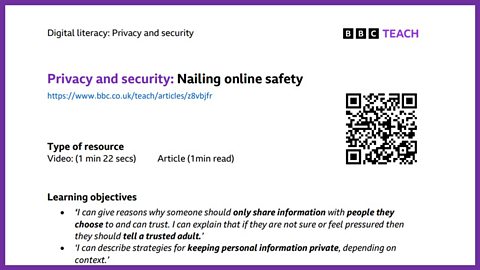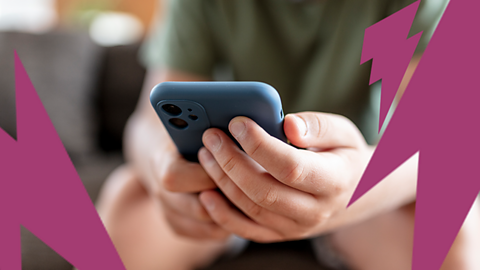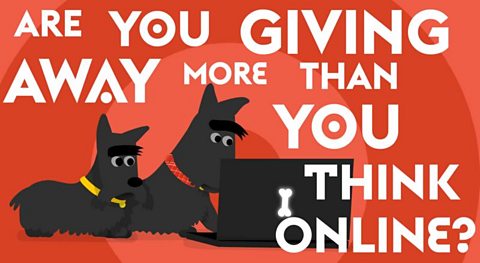Video summary
A video where presenter Laura gives tips on how to stay safe online. She explains how important it is to check your privacy settings on online profiles and to think about what you post online.
Tips on staying safe online
Can you imagine meeting a stranger for the first time and telling them everything about your life? What about starting out by showing them pictures of you when you with your friends and family? That would be weird right? So why do it online?
Remember that whenever you post or share something on social media, that content could potentially live there forever.
Everything you put on the internet adds to your 'digital footprint' the picture of you created by all the information the internet holds.
So, when it comes to interacting online you should always be extra careful. Here are some great ways to get started:
- Set your privacy settings right
- Keep your personal information to yourself
- Get permission from an adult before you post about yourself online
- Always be kind when you talk to people and make sure you report nasty comments
- If something is bothering you online, talk to a trusted adult.
Video: 1 min 22 secs
Article: 1 min read
Learning objectives
(from the set out by the UK Council for Internet Safety)
ÔÇÿI can give reasons why someone should only share information with people they choose to and can trust. I can explain that if they are not sure or feel pressured then they should tell a trusted adultÔÇÖ
ÔÇÿI can describe strategies for keeping personal information private, depending on contextÔÇÖ
ÔÇÿI can describe simple ways to increase privacy on apps and services that provide privacy settingsÔÇÖ
Glossary
- Impact: the effect something has on something else
- Privacy Settings: the settings that allow you to control how much information is available to the public
- Regret: to feel bad or sorry about something you have done, or have failed to do
- Posting: something that is shared online to the personÔÇÖs network; this could be a private network of approved people or a public network, such as a forum
Topic introductions and starters
Before the video:
- Ask pupils to write down the five most important ways they know to keep safe online ÔÇô think about all previous learning in this area
After the video:
- Watch video again and ask pupils to make notes using a grid/box for each section ÔÇôpause the video at each new section to allow time for note taking
- Clarify understanding of any new key vocabulary or specific terminology ÔÇô impact, privacy, settings, posting, regret, aspect, block, clicks
- Discuss the differences between personal, private and public information, and clarify the difference between the three types
- Use printed screenshots of the video and add speech bubbles
- Make a list of the main headings of the video and put them into order of importance. Is this easy to do? Are they all as important as each other?
Discussion Points
What is stranger danger? Is it the same online and offline? How can you keep yourself safe?
Is it easy to change privacy settings on devices? Should the apps make the settings easier to find? Should the settings be stricter by default?
Is it safer for children to communicate and make friends online or offline? What are the main differences? What aspects are the same in both?
Fillers and fast finisher activities
- Summarise the information covered in each section of the video into one sentence. Then try and reduce that even further to just a few key words
- Write an acrostic poem about staying safe online using the letters STAYING SAFE as the first letter of each line
- Use emojis to create a top tips list of ways to stay online ÔÇô either using ICT or hand drawing them
- Create a quiz for younger children or parents using the advice from the video ÔÇô try out true/false, yes/no and multiple choice questions
Signposting potential homework activities
- Share the video and/or the advice given with family - check everyoneÔÇÖs privacy settings together on apps and platforms they use
- Create a ÔÇÿtop tipsÔÇÖ style list of easy to remember tips to help stay safe
- Write a script for a short extra scene to the video covering another aspect of online safety or repeating one of the areas covered ÔÇô try and make it funny
- Create an illustrated mind-map covering the advice given, with potential consequences if the advice is not followed.
For download/printing

More from: Privacy and security
Avoiding account hacks. document
Tips and advice on ways to avoid online accounts being ÔÇÿhackedÔÇÖ or taken over by someone without your permission.

Are you giving away more than you think online? document
An article about things to think about when online, such as how smartphones track information and being careful about sharing information.

Oti Mabuse - what I do and don't share. video
Former Strictly star and dancer Oti Mabuse gives her tips for asking for permission before putting up posts of other people.
